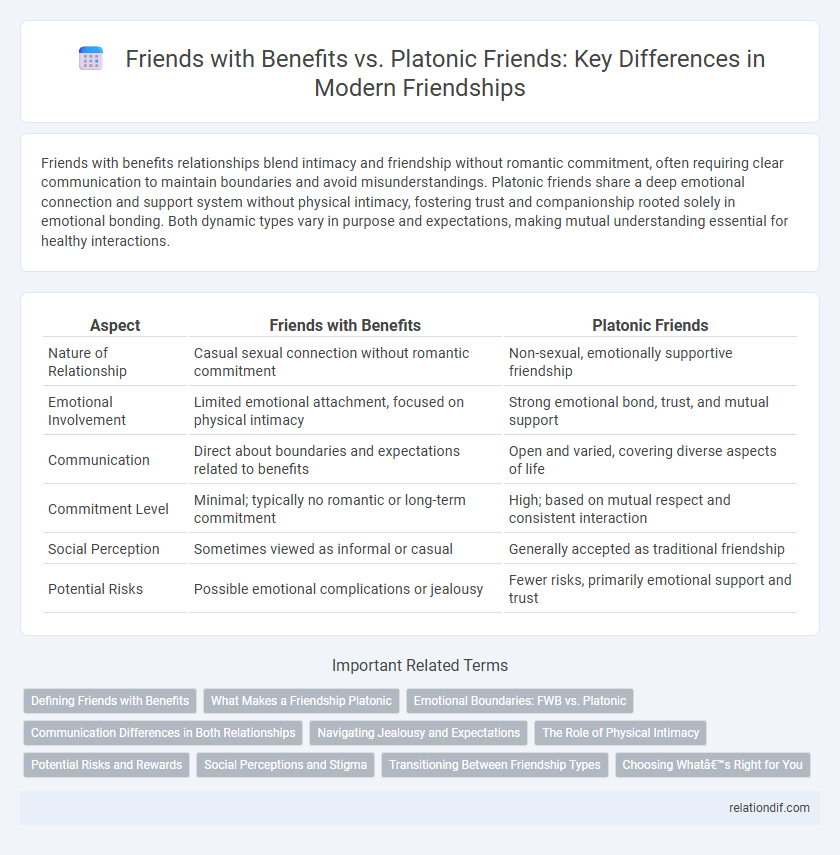Friends with benefits relationships blend intimacy and friendship without romantic commitment, often requiring clear communication to maintain boundaries and avoid misunderstandings. Platonic friends share a deep emotional connection and support system without physical intimacy, fostering trust and companionship rooted solely in emotional bonding. Both dynamic types vary in purpose and expectations, making mutual understanding essential for healthy interactions.
Table of Comparison
| Aspect | Friends with Benefits | Platonic Friends |
|---|---|---|
| Nature of Relationship | Casual sexual connection without romantic commitment | Non-sexual, emotionally supportive friendship |
| Emotional Involvement | Limited emotional attachment, focused on physical intimacy | Strong emotional bond, trust, and mutual support |
| Communication | Direct about boundaries and expectations related to benefits | Open and varied, covering diverse aspects of life |
| Commitment Level | Minimal; typically no romantic or long-term commitment | High; based on mutual respect and consistent interaction |
| Social Perception | Sometimes viewed as informal or casual | Generally accepted as traditional friendship |
| Potential Risks | Possible emotional complications or jealousy | Fewer risks, primarily emotional support and trust |
Defining Friends with Benefits
Friends with benefits relationships combine platonic friendship with casual sexual interaction, differentiating them from purely platonic friendships that involve emotional connection without physical intimacy. These arrangements emphasize mutual agreement on boundaries and expectations, often lacking romantic commitment while maintaining a social bond. Understanding the distinction hinges on recognizing the presence of consensual sexual activity alongside the foundational friendship.
What Makes a Friendship Platonic
A platonic friendship is defined by the absence of romantic or sexual attraction, emphasizing emotional support, trust, and mutual respect. Communication in platonic friendships centers on shared experiences and personal growth without physical expectations. Clear boundaries and honest conversations maintain the integrity and comfort essential for a truly platonic connection.
Emotional Boundaries: FWB vs. Platonic
Friends with benefits (FWB) relationships involve blurred emotional boundaries where physical intimacy often complicates emotional detachment, potentially leading to mixed feelings or attachment. Platonic friends maintain clear emotional boundaries, fostering deep companionship and trust without romantic or sexual involvement, which minimizes emotional confusion. Understanding these distinctions helps individuals set appropriate expectations and preserve emotional well-being in each type of friendship.
Communication Differences in Both Relationships
Friends with benefits relationships rely heavily on clear, direct communication about boundaries, expectations, and physical intimacy to avoid misunderstandings and emotional complications. Platonic friends typically share open, emotionally supportive conversations centered on mutual interests and personal growth without the complexity of sexual dynamics. Effective communication in both types of friendships ensures trust and respect, but the content and focus differ significantly due to the presence or absence of romantic or sexual elements.
Navigating Jealousy and Expectations
Friends with benefits relationships often require clear communication to navigate jealousy and align expectations, as romantic feelings can complicate boundaries. Platonic friendships typically have fewer emotional conflicts related to jealousy, fostering trust through mutual respect and straightforward understanding. Establishing honesty and setting limits early on helps both types of friendships maintain balance and emotional well-being.
The Role of Physical Intimacy
Physical intimacy distinguishes friends with benefits from platonic friends by introducing a sexual component absent in platonic relationships. While platonic friends share emotional support and companionship without sexual involvement, friends with benefits balance friendship with regular consensual physical contact. The role of physical intimacy in friends with benefits often complicates boundaries and emotional dynamics compared to purely platonic friendships.
Potential Risks and Rewards
Friends with benefits relationships offer increased physical intimacy and potential emotional support but carry risks such as blurred boundaries, jealousy, and complications in communication. Platonic friendships provide stable emotional connection and trust without romantic entanglements, minimizing risks of misunderstandings or relationship strain. Understanding expectations and maintaining clear communication are crucial in managing the benefits and challenges inherent in both types of friendships.
Social Perceptions and Stigma
Friends with benefits relationships often face social stigma due to perceptions of moral ambiguity and assumptions about the lack of emotional depth, contrasting with the generally positive societal view of platonic friendships as stable and morally acceptable connections. Cultural norms frequently categorize friends with benefits as less legitimate, leading to judgment and questioning of participants' intentions. Platonic friendships are widely recognized for providing emotional support and fostering social bonding without romantic or sexual expectations, reinforcing their acceptance across diverse social settings.
Transitioning Between Friendship Types
Transitioning from friends with benefits to platonic friends requires clear communication and mutual understanding of boundaries to maintain emotional balance. Emotional detachment and redefining expectations help prevent misunderstandings and preserve the foundation of trust. Navigating this shift can strengthen long-term friendship by fostering respect and honesty.
Choosing What’s Right for You
Choosing between friends with benefits and platonic friends depends on emotional needs and boundaries. Friends with benefits offer physical intimacy without commitment, while platonic friends provide emotional support and companionship without romantic involvement. Identifying personal priorities and communication preferences helps ensure healthy, fulfilling relationships aligned with individual well-being.
Friends with benefits vs platonic friends Infographic

 relationdif.com
relationdif.com